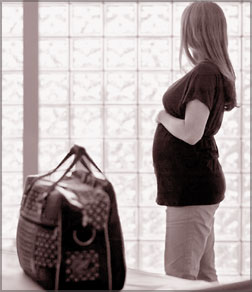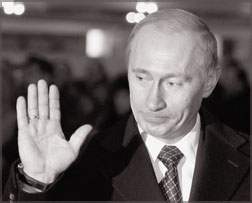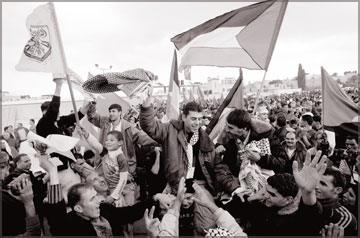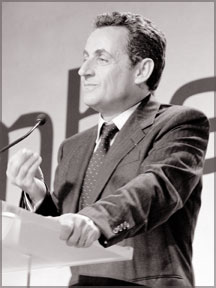
Britain's unwanted girls
by Sanjiv Buttoo
Cultural pressure to have a boy is leading some British women of
Asian origin to travel to India for abortions to avoid having a girl.
Among them is Meena, whose name has been changed to protect her
identity. She describes what led her to do such a thing.
"As soon as you're pregnant everyone sits there and looks at you and
constantly says: 'you're going to have a boy. We'll do this and we'll do
that and we'll have celebrations'," she said.
But when the child is actually born and it's a girl, everyone around
you feels disappointed - they say: 'well, never mind'."

Meena, an office worker in her 30s, is from a middle-class Punjabi
family and was born and brought up in the UK.
She has three daughters under 13. But says she has been made to feel
a failure for not producing a son.
Meena says Indian culture can still exert a huge pressure on women to
have boys - to carry the family name and because girls are expensive -
and that the pressure exists on Indian women living in Britain too.
"It is all up to the husband and it's usually the husband's side of
the family who - you know - are putting the pressure on."
So last year, when Meena became pregnant for the fourth time, she and
her husband decided to go to India to find out what sex their unborn
child was.
Sex test
"We were worried about what would happen if it was another girl,
because obviously it has consequences on the family as well as financial
implications, so we decided to see what we were having this time."
Meena was able to look up the best gynaecologists in India on the
internet.

"Once we approached them, they seemed fairly understanding when they
realised that we had three other daughters already and we wanted to know
what the sex of this child was."
After Meena and her husband had the test in Delhi, they were told it
was another girl. They thought the burden and pressure would be too
much, so decided to terminate.
"Personally it was very upsetting for me. I didn't really want my
other children to know, and I don't mean it in a bad way, but my husband
seemed rather blas‚ about it. I think I felt bad because I knew I
shouldn't be doing this - for the reasons I was doing it - it wasn't
nice."
Female foeticide
Sex selective abortion - female foeticide, as it is known - has been
illegal in India since the early 1980s. Having a scan to find out the
sex is also against the law.
But the law has simply forced the practice underground and UN figures
state that 750,000 girls are aborted every year in India.
Now it appears that some Indian women in Britain are travelling from
the UK to India to have abortions.
Meena says that she is not alone - she knows other women who have
terminated girls. But it is a taboo subject.
"I've heard of other people who have done it, but if you start
showing interest in things like that, especially when you've had three
daughters yourself, people will start thinking 'Oh yes, she must be
interested in doing that as well,' so you try and keep away from it and
deal with it yourself."
For Meena, it got harder after her sister-in-law produced boys. In a
Punjabi family, how highly you are thought of frequently depends on the
children you have.
"I believe that's why I'm getting more and more pressure: if she can
do it, I should be able to do it." Meena has four sisters.
"I know they do sometimes think 'her mother was like that as well'.
It is really not a nice feeling when you've had your baby and you are
really proud of her and they turn around and dismiss her as just another
mistake."
It is not just the family that applies pressure. Meena says it is a
preoccupation amongst her friends - her generation - as well.
"I look around and think the people who are doing this, you're women
as well, surely you must have gone through this?
"I don't think I would ever do this to my daughters. Obviously
they're not going to stay with me - they're going to get married and who
knows what pressure they'll be put under - but they'll certainly never
get it off me."
'No choice'
It has been a year since Meena had her abortion. She still thinks
about how the child would have been now, how she would have fitted in
with the family and with her sisters.
"I do have regrets. I don't know why that particular daughter ended
up having no part of my life. I had no choice."
She has not decided whether she is going to have another child - it
depends on how much pressure she is put under.
But Meena is scared. She is worried for her health, and how going
through another abortion will affect her. Her eyes are sad.
"If we decide that we're going to try for another child, I know that
I'm going to have to go through the same thing again."
BBC
Rudd takes Australia inside Kyoto
Australian Labor Party leader Kevin Rudd was sworn in as prime
minister, following a landslide victory in parliamentary elections last
week.
Immediately after the ceremony, he signed documents to ratify the
Kyoto Protocol on climate change, reversing the previous
administration's policy.

"This is the first official act of the new Australian government," he
said.
Australia's new stance on Kyoto will isolate the US as the only
developed nation not to have ratified the treaty.
Mr Rudd is due to attend the UN climate change conference in Bali
next week with four of his ministers.
When they heard of Mr Rudd's decision, delegates at the conference
erupted in applause.
Mr Rudd's appointment as prime minister ends more than 11 years of
conservative government under his predecessor John Howard.
As well as signing up to the Kyoto Protocol, the new government is
committed to withdrawing Australia's combat troops from Iraq.
A new approach
Mr Rudd and 29 other ministers took the oath of office at a ceremony
in Canberra on Monday morning.
The new line-up has many differences from Mr Howard's administration.
Mr Rudd, a 50-year-old former diplomat, is the first Australian born
after the end of World War II to hold the office.
Deputy Prime Minister Julia Gillard is the first woman to hold the
post, and the new government also includes a former rock star, Peter
Garrett, as the environment minister.
The minister with responsibility for climate change, Penny Wong, is
not only the country's first openly gay minister but the first to be
born in Asia.
The new approach to the environment is one of the main ways in which
Mr Rudd is signalling a definitive break with the past.
He made the ratification of the Kyoto Protocol one of his key
election pledges, and has lost no time in signing the paperwork to bring
it into force. Australia will be an official signatory of the Kyoto
treaty in 90 days time.
Signing the Kyoto Protocol is "a significant step forward in our
country's efforts to fight climate change domestically - and with the
international community," Mr Rudd said on Monday.
He said his government would do "everything in its power" to help
Australia meet its Kyoto obligations - and has set a long-term target of
cutting carbon emissions by 60% of 2000 levels by 2050.
Mr Howard steadfastly refused to sign the Kyoto agreement, arguing
that there was no point unless big polluters among developing countries
such as China and India were also subject to similar targets.
BBC
Kremlin insists election was fair
The Kremlin has rejected concerns about Sunday's parliamentary
election which gave President Vladimir Putin's United Russia party an
overwhelming victory.
Mr Putin called his party's two-thirds share of the vote a sign of
political stability and thanked the electorate for turning out in high
numbers.

International observers and some western governments have expressed
concern about the poll's conduct.
The German government said Russia was not a democracy.
BBC Moscow correspondent James Rodgers says the main question now is
what Mr Putin will do with his big majority.
Political stability
With nearly all ballots counted, Mr Putin's United Russia had 64.1%
of the vote, the electoral commission said. Turnout was about 63%.
The Communist Party, with 11.6% of the vote, was the only opposition
party to gain seats in the State Duma, while liberal opposition parties
looked certain to fall below the 7% threshold needed to enter
parliament.
Two parties allied to the Kremlin - A Fair Russia and the right-wing
Liberal Democratic Party - were also poised to win seats.
Kremlin spokesman Dmitry Peskov told the BBC the election had been
free and fair and that any allegations of voting irregularities would be
investigated.
"In general what we saw yesterday is just and fair democratic
elections," he said. Mr Putin described the election as a "good example
of domestic political stability".
Foreign observers from the Organisation for Security and Co-operation
in Europe and the Council of Europe said the election was "not fair".
It "failed to meet many OSCE and Council of Europe commitments and
standards for democratic elections", they said.
The independent Russian monitoring group, Golos, reported various
violations during the voting, which it said amounted to "an organised
campaign".
In some cases, it said, state employees and students were pressured
to vote, and those voting for United Russia were entered into a prize
lottery in St Petersburg.
The German government said the elections were neither free nor fair
and it called for Russia to embrace multi-party politics.
The White House said it urged the Russian authorities to investigate
alleged violations.
Putin's influence
Mr Putin is constitutionally obliged to stand down after his second
term as president ends in March next year.
The BBC's James Rodgers in Moscow says his party's win will enable
him to continue wielding great influence in politics - even if he is no
longer in high office.
Mr Putin announced this year he may seek the office of prime minister
after his presidential term ends.
Even Kremlin insiders admit to being in the dark about what their
boss is thinking, our correspondent says.
President Putin could become prime minister or take up another post
while his opponents suspect he may use this new mandate to change the
law and stay in office, he adds.
BBC
At home with Israelis and Palestinians
by Hugh Sykes
Following the Middle East peace conference in the US city of
Annapolis, most Israelis and Palestinians yearn for a resolution that
will allow them to live normal, peaceful lives.
On the stone paving around the Dome of the Rock - its golden dome
gleaming in the autumn sunshine above the site that it shares with
Jerusalem's al-Aqsa mosque - two 10-year-old boys were selling postcards
to tourists.

And when there were no customers, they played with two small kittens,
chasing them in the shadows of the trees nearby and picking them up and
stroking them and smiling. Below the mosque and the Dome of the Rock,
there is the Jewish holy place, the Western Wall.
One day I saw an Orthodox Jew praying intently there, his face to the
wall, and bowing rhythmically and rapidly as he prayed.
A moment later, he picked up his small daughter and, standing on the
stone paving near the wall, he swung her round and round by her arms.
And he smiled and she laughed with delight.
I experienced a similar symmetry of affection and cheerfulness during
two evenings here in the past few days: one with a family in a Jewish
settlement, the other with a Palestinian family in mostly Arab East
Jerusalem.
I was invited to the settlement for Shabbat evening, the beginning of
the Jewish Sabbath, 24 hours of pause and reflection and family life and
no work which starts at sundown on a Friday evening.
Jewish welcome
My host took me to the synagogue and he promised me a lot of cheerful
singing. And that is how it was.
The congregation prayed and chanted and sang facing Jerusalem. On my
left, a Moroccan Jew with his son on his lap smiled and shook my hand
and asked me where I was from.
And on my right, my host gave me a quiet running commentary, and his
three-year-old daughter wandered about playing with a small toy spring
(a Slinky, it is called and, if you get it right, it will coil and
uncoil down steps).
Then we all formed a line and shuffled along, hands on the shoulders
of the man in front, swaying and singing.
A psychologist who came to settle here from New York gave a sermon
about Jacob and Esau, and the lesson that Jews should gather food, offer
gifts and prepare for war.
And my host and I walked back home, talking about the phenomenon of
fragmentation, the regrettable effect that many aspects of modern life
can have on the family and the community.
How for instance, the stress of insecure employment can undermine
stability by generating unhealthy competition, individualism and
isolation.
And then the Shabbat meal - my host's wife and their four daughters
and three sons at a long table with napkins in rings.
But first he blessed each child one by one in order of age, holding
their heads in his hands, murmuring a prayer and kissing them on the
forehead.
And we tucked into humous and tahini and tomatoes in vinaigrette and
aubergine salad with raw garlic and chicken soup with chicken neck and
potatoes and carrots.
And another course - chicken breast with mushrooms and garlic - and
pudding too - chocolate brownie cake baked by one of the girls. There
was wine as well - good local wine - and beer for the teenagers.
There was warm, loving family banter and prayers and singing, and we
rounded the evening off playing table-tennis in the garage.
I drove back to my hotel in the cold night air, enriched by the love
and laughter of their home.
Palestinian hospitality
Twenty-four hours later, in East Jerusalem, I was sitting at a
Palestinian family table with my host and his wife and their two sons
and daughters, eating tomato and cucumber salad, green bean salad,
knuckle of lamb with rice and almonds, and fruit and mint tea.
And the 10-year-old boy brought out a chess board and I beat him, but
then he sat at the computer to play chess again and he won.
And we played the card game Uno where the aim is to end up with an
empty hand. And he giggled with delight when I trumped him with the card
that meant he had to pick up two more, and I teased him that the extra
cards (that meant he might lose) were a gift from me.
And throughout the entire game we spoke in French. He goes to a
bilingual Arabic-French school.
And I drove back to my hotel in the cold night air, enriched by the
love and laughter of their home.
We did not speak about Annapolis or the peace process at either meal
but I left both thinking that there could be real reconciliation and
peace if only the enmity that the two families theoretically feel for
each could be supplanted by the heart-warming warmth and decency of each
of them.
BBC
Sarkozy says colonial rule unjust
French President Nicolas Sarkozy has said during a visit to former
colony Algeria that his country's colonial rule was "profoundly unjust".
Mr Sarkozy was recently attacked by some in Algeria over his refusal
to apologise for France's colonial past.
Mr Sarkozy said both France and Algeria should fight "all forms of
racism".
France invaded Algeria in 1830. An eight-year war of independence in
the 1950s and 1960s cost hundreds of thousands of lives.
'Jewish lobby'
Mr Sarkozy expects to finalise a series of big business deals during
the visit. In a speech to Algerian business leaders, Mr Sarkozy
condemned colonialism.

"Yes, the colonial system was profoundly unjust, contrary to the
three founding words of our Republic: freedom, equality, brotherhood,"
he said.
"But it's also fair to say that inside the system, there were many
men and women who liked Algeria, before having to leave it."
He said numerous crimes had been committed on both sides during
Algeria's independence war from 1954 to 1962.
"The moment has come to entrust Algerian and French historians with
the task of writing this page of tormented history together," Mr Sarkozy
said.
A minister in Algerian President Abdelaziz Bouteflika's government
attacked Mr Sarkozy last week, saying he had been elected thanks to the
"Jewish lobby", alluding to the Jewish origins of his maternal
grandfather.
Mr Bouteflika later said those comments did not reflect the official
position. Mr Sarkozy said on Monday: "There is nothing that more closely
resembles anti-Semitism than Islamophobia. Both have the same face: that
of stupidity and hate."
He has concentrated on the increasing economic ties between the two
countries, expressing the hope of signing contracts worth 5bn euros
(ś3.55bn).
The contracts include billion dollar investments in the Algerian oil
and gas business by the French energy companies Total and Gaz de France.
France is already the biggest investor in Algeria outside the energy
sector.
BBC
Chavez defeated over reform vote
Venezuelan President Hugo Chavez has narrowly lost a referendum on
controversial constitutional changes.
Voters rejected the raft of reforms by a margin of 51% to 49%, the
chief of the National Electoral Council said.
Mr Chavez described the defeat as a "photo finish", and urged
followers not to turn it into a point of conflict.

Correspondents say the opposition could barely hide their delight and
that the victory will put a brake on Mr Chavez's self-styled "Socialist
revolution".
Celebrations by the opposition began almost immediately in the
capital, Caracas, with activists cheering, beeping car horns and waving
flags.
"Venezuela won today, democracy won today, and I am sure that this
victory for the Venezuelan people will have a very important impact in
the rest of Latin America," Leopoldo Lopez, opposition mayor of Caracas'
Chaqua municipality, told the BBC.
Don't feel sad
The BBC's James Ingham in Caracas says Mr Chavez had expected a big
win and will be very disappointed.
However, he swiftly conceded and urged the opposition to show
restraint.
"To those who voted against my proposal, I thank them and
congratulate them," he said. "I ask all of you to go home, know how to
handle your victory."
He insisted that he would "continue in the battle to build
socialism".
"Don't feel sad," he told his supporters, saying there were
"microscopic differences" between the "yes" and "no" options.
He said the reforms had failed "for now" but they were "still alive".
Our correspondent says that some of Mr Chavez' loyal supporters have
gone against him on this occasion.
Though some of them may still support him, he says, they think he has
gone a little too far in a country which has a history of dictatorships.
Too much power
The result marks the president's first electoral reverse since he won
power in an election in 1998.
Since then he has set about introducing sweeping changes in the
country's laws aimed at redistributing Venezuela's oil wealth to poorer
farmers in rural areas.
Just a year ago, he was re-elected with 63% of the vote.
But analysts say the defeat should cause him to rethink the pace and
scope of his reforms. With his constitutional reform proposals, Mr
Chavez was seeking an end to presidential term limits and the removal of
the Central Bank's autonomy.
Having lost the vote, the current rules state that he will have to
stand down in 2013. The main opposition parties had claimed during the
referendum campaign that Mr Chavez was seeking to give himself too much
power, and was trying to establish a dictatorship.
Mr Chavez said the package of reforms was necessary to "construct a
new socialist economy".
BBC |
